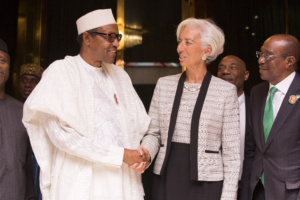The International Monetary Fund (IMF) has estimated that the annual cost of bribery — just one sub-set of corruption — to be between $1.5 and $2trillion.

This, the Fund estimated to be about two per cent of global Gross Domestic Product (GDP). It argued that the costs represent the tip of the iceberg, saying the long-term impacts are much deeper.
The Managing Director of the IMF, Christine Lagarde, said this in a presentation titled: ‘Addressing Corruption with Clarity,’ at the Brookings Institution, Washington, DC, on Monday.
It is believed that bribery and corruption is one of the factors that have hindered growth in a lot of African countries, including Nigeria.
However, Lagarde, pointed out that in order to tackle corruption, there was the need to acknowledge the problem plainly and measure its impact accurately.
“We all know that corruption is a complex problem often involving multiple actors who operate in the shadows.
“Consider just one example — a bribe in the extractive industries. Yes, a local official may demand a bribe, or a government ministry may turn a blind eye, but what about the company who proffers the money? Surely, it participates in the illicit transaction.
“After all, for every bribe accepted, one must be offered. For this reason, as we assist our members in fighting public corruption, we also are committed to looking at transnational private actors who influence public officials.
“Private actors may help generate corruption through direct means such as bribery, but they also can facilitate corruption through indirect means, such as money laundering and tax evasion,” she explained.
According to her, the case of the “Panama Papers,” underscored the pernicious way corruption can quietly spread across borders.
She noted the growing consensus among members that corruption remains a macro-critical issue in many countries.
“It has become clear that systemic corruption undermines the ability of states to deliver inclusive growth and lift people out of poverty.
“It is a corrosive force that eviscerates the vitality of business and stunts a country’s economic potential.
“Think of a government spending taxpayer money on a glamorous, but unnecessary new convention centre, whose ulterior purpose is to generate kick-backs.
A year after construction begins, it turns out that funds in the social service coffers are somehow no longer available for their original beneficiaries.
“Over time, the money diverted from education or health care perpetuates inequality, and limits the possibility of better paying jobs and a better life,” she said.
According to her, as this type of corruption becomes institutionalised, distrust in government grows and poisons the ability of a nation to attract foreign direct investment. The result is a negative feedback loop from which it is difficult to break free, she added.
She added: “Millennials feel this reality acutely. A recent survey of global youth revealed that young people identify corruption, not jobs, not lack of education, as the most pressing concern in their own countries.
“There is wisdom in this insight — since corruption is a root cause of many of the economic injustices young men and women experience every day.
“Young people also understand another truth; corruption is not limited to one kind of country or economy — it can impact every nation. From embezzlement, to nepotism, to terrorist financing, corruption’s nefarious tentacles can take on different forms depending on the environment where it incubates.”
Lagarde further said tackling corruption has long been a part of IMF work. She disclosed that last month, the IMF Executive Board took stock of the fund’s progress and committed to confronting the problem even more directly moving forward.
She said the Board agreed that members would benefit from an increase in granular policy advice, and a candid, even-handed assessment of the economic impact of corruption.
“To achieve this goal, new methodologies are needed to better quantify and analyse the problem. That is why I am pleased that today’s event marks the launch of two new anti-corruption research initiatives led by Brookings, the World Bank, the IFC, and their partners.
“Since corruption is often hidden and difficult to measure, new policies can take years to become effective. Meanwhile, some governments are reluctant to even engage on the issue because they see corruption as a political, and not an economic problem. But that is no reason to stop pressing forward.
“I believe the IMF can only be true to its mandate if we speak about corruption with clarity and offer all the tools at our disposal to help our members,” she added.
Kindly follow us on twitter:@AfricanVoice2










